Comparative Business Ethics: Facebook Data Privacy and Apple's Role
VerifiedAdded on 2021/05/31
|13
|3179
|396
Essay
AI Summary
This essay examines the ethical and social responsibility issues surrounding Facebook's data privacy breaches, particularly highlighting the Cambridge Analytica scandal and its impact on user trust. The essay analyzes the company's unethical decisions, including the leakage of personal data, and discusses the legal obligations and governance failures that ensued. It contrasts Facebook's actions with Apple's approach to data privacy, showcasing the importance of ethical decision-making and corporate social responsibility. The essay further explores the ethical decision-making process, including identifying ethical issues, collecting relevant information, evaluating alternatives, and implementing solutions. It emphasizes the need for organizations to adhere to codes of conduct and relevant laws to protect user data and maintain public trust. The conclusion reinforces the significance of ethical considerations in business operations and the importance of proactive measures to prevent data breaches and uphold user privacy.

qwertyuiopasdfghjklzxcvbnmqw
ertyuiopasdfghjklzxcvbnmqwert
yuiopasdfghjklzxcvbnmqwertyui
opasdfghjklzxcvbnmqwertyuiop
asdfghjklzxcvbnmqwertyuiopasd
fghjklzxcvbnmqwertyuiopasdfgh
jklzxcvbnmqwertyuiopasdfghjkl
zxcvbnmqwertyuiopasdfghjklzxc
vbnmqwertyuiopasdfghjklzxcvb
nmqwertyuiopasdfghjklzxcvbnm
qwertyuiopasdfghjklzxcvbnmqw
ertyuiopasdfghjklzxcvbnmqwert
yuiopasdfghjklzxcvbnmqwertyui
opasdfghjklzxcvbnmqwertyuiop
asdfghjklzxcvbnmqwertyuiopasd
fghjklzxcvbnmqwertyuiopasdfgh
jklzxcvbnmrtyuiopasdfghjklzxcv
Comparative Business Ethics & Social Responsibility
Essay
6/16/2018
Student Name
ertyuiopasdfghjklzxcvbnmqwert
yuiopasdfghjklzxcvbnmqwertyui
opasdfghjklzxcvbnmqwertyuiop
asdfghjklzxcvbnmqwertyuiopasd
fghjklzxcvbnmqwertyuiopasdfgh
jklzxcvbnmqwertyuiopasdfghjkl
zxcvbnmqwertyuiopasdfghjklzxc
vbnmqwertyuiopasdfghjklzxcvb
nmqwertyuiopasdfghjklzxcvbnm
qwertyuiopasdfghjklzxcvbnmqw
ertyuiopasdfghjklzxcvbnmqwert
yuiopasdfghjklzxcvbnmqwertyui
opasdfghjklzxcvbnmqwertyuiop
asdfghjklzxcvbnmqwertyuiopasd
fghjklzxcvbnmqwertyuiopasdfgh
jklzxcvbnmrtyuiopasdfghjklzxcv
Comparative Business Ethics & Social Responsibility
Essay
6/16/2018
Student Name
Paraphrase This Document
Need a fresh take? Get an instant paraphrase of this document with our AI Paraphraser
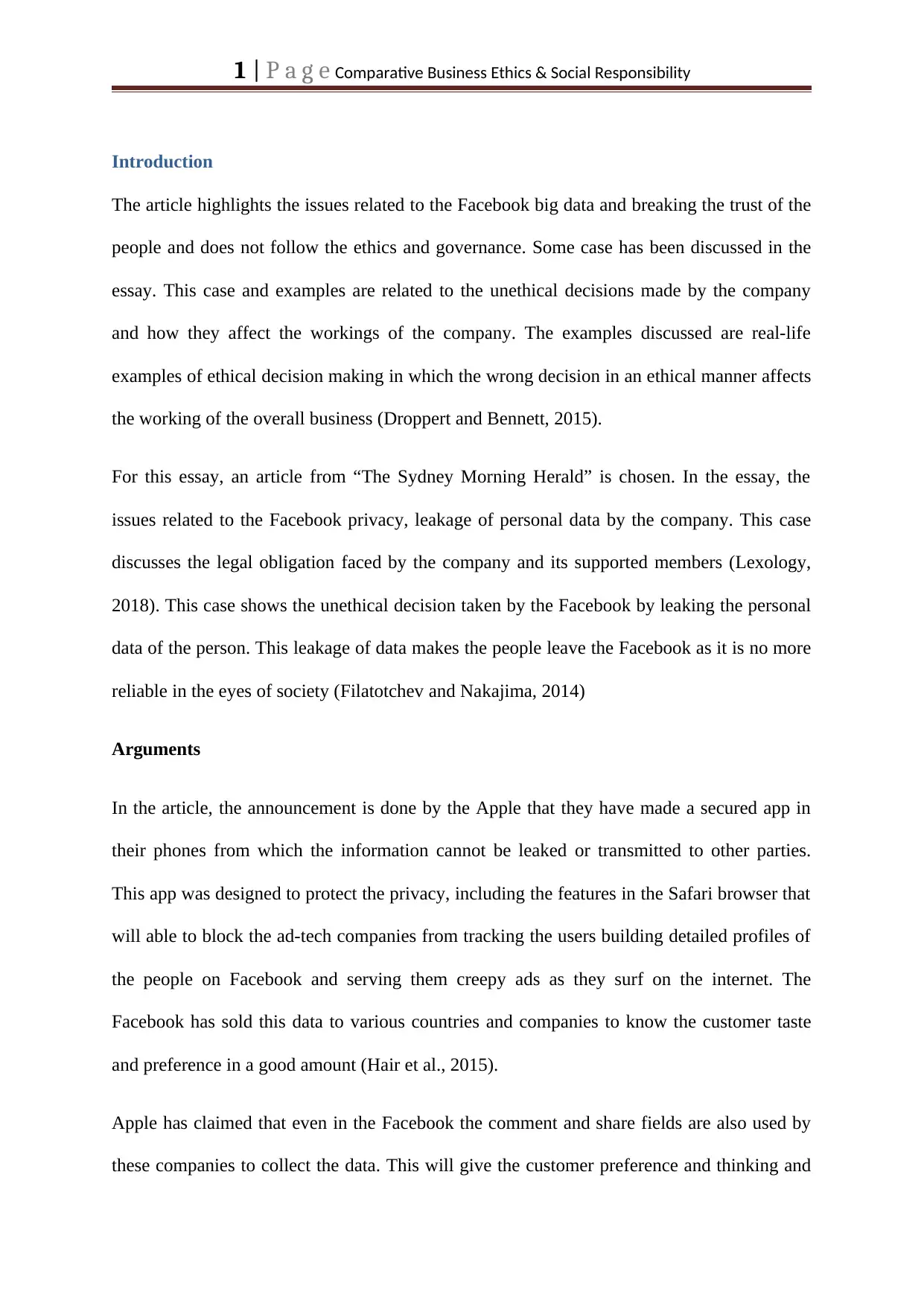
1 | P a g e Comparative Business Ethics & Social Responsibility
Introduction
The article highlights the issues related to the Facebook big data and breaking the trust of the
people and does not follow the ethics and governance. Some case has been discussed in the
essay. This case and examples are related to the unethical decisions made by the company
and how they affect the workings of the company. The examples discussed are real-life
examples of ethical decision making in which the wrong decision in an ethical manner affects
the working of the overall business (Droppert and Bennett, 2015).
For this essay, an article from “The Sydney Morning Herald” is chosen. In the essay, the
issues related to the Facebook privacy, leakage of personal data by the company. This case
discusses the legal obligation faced by the company and its supported members (Lexology,
2018). This case shows the unethical decision taken by the Facebook by leaking the personal
data of the person. This leakage of data makes the people leave the Facebook as it is no more
reliable in the eyes of society (Filatotchev and Nakajima, 2014)
Arguments
In the article, the announcement is done by the Apple that they have made a secured app in
their phones from which the information cannot be leaked or transmitted to other parties.
This app was designed to protect the privacy, including the features in the Safari browser that
will able to block the ad-tech companies from tracking the users building detailed profiles of
the people on Facebook and serving them creepy ads as they surf on the internet. The
Facebook has sold this data to various countries and companies to know the customer taste
and preference in a good amount (Hair et al., 2015).
Apple has claimed that even in the Facebook the comment and share fields are also used by
these companies to collect the data. This will give the customer preference and thinking and
Introduction
The article highlights the issues related to the Facebook big data and breaking the trust of the
people and does not follow the ethics and governance. Some case has been discussed in the
essay. This case and examples are related to the unethical decisions made by the company
and how they affect the workings of the company. The examples discussed are real-life
examples of ethical decision making in which the wrong decision in an ethical manner affects
the working of the overall business (Droppert and Bennett, 2015).
For this essay, an article from “The Sydney Morning Herald” is chosen. In the essay, the
issues related to the Facebook privacy, leakage of personal data by the company. This case
discusses the legal obligation faced by the company and its supported members (Lexology,
2018). This case shows the unethical decision taken by the Facebook by leaking the personal
data of the person. This leakage of data makes the people leave the Facebook as it is no more
reliable in the eyes of society (Filatotchev and Nakajima, 2014)
Arguments
In the article, the announcement is done by the Apple that they have made a secured app in
their phones from which the information cannot be leaked or transmitted to other parties.
This app was designed to protect the privacy, including the features in the Safari browser that
will able to block the ad-tech companies from tracking the users building detailed profiles of
the people on Facebook and serving them creepy ads as they surf on the internet. The
Facebook has sold this data to various countries and companies to know the customer taste
and preference in a good amount (Hair et al., 2015).
Apple has claimed that even in the Facebook the comment and share fields are also used by
these companies to collect the data. This will give the customer preference and thinking and
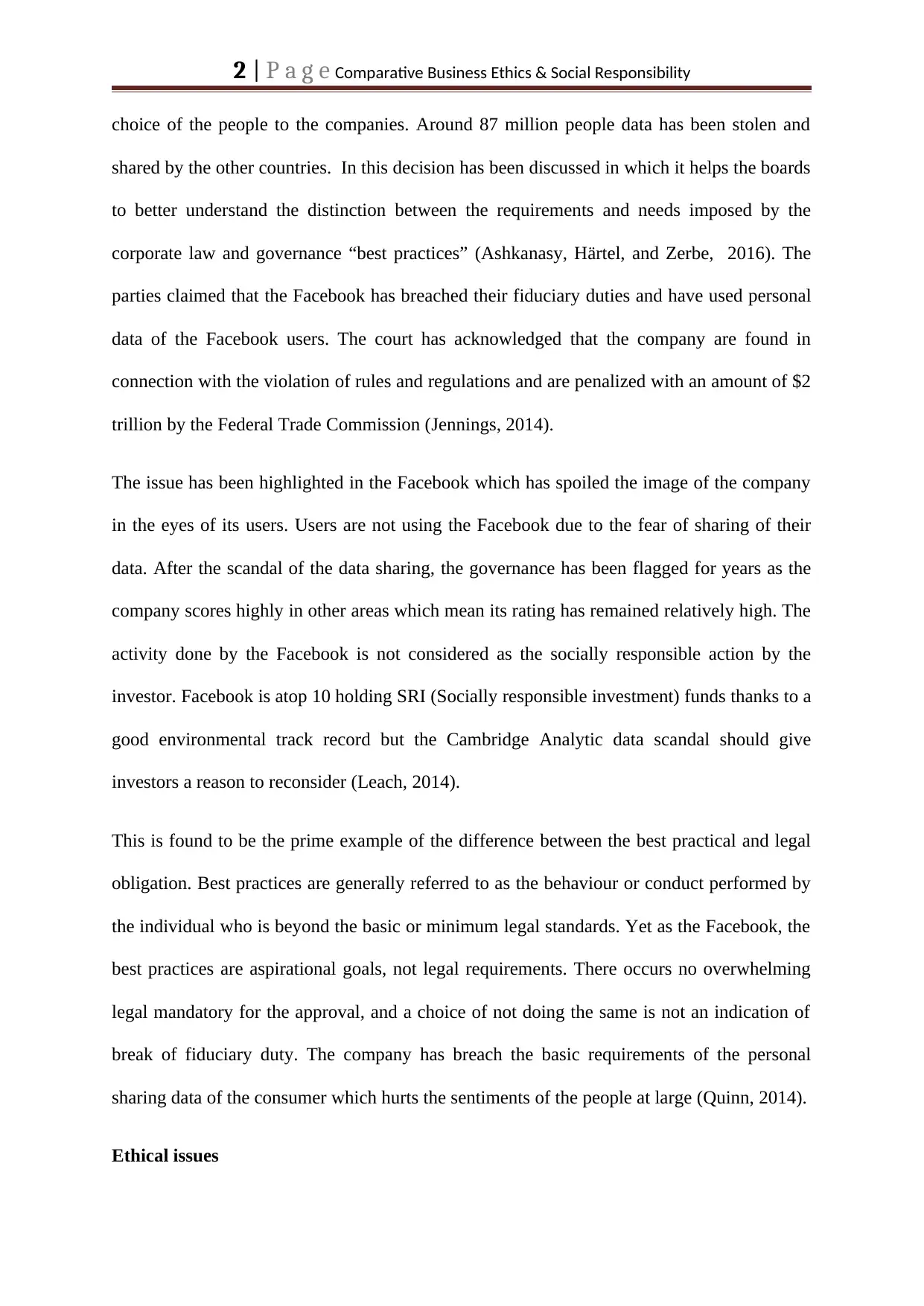
2 | P a g e Comparative Business Ethics & Social Responsibility
choice of the people to the companies. Around 87 million people data has been stolen and
shared by the other countries. In this decision has been discussed in which it helps the boards
to better understand the distinction between the requirements and needs imposed by the
corporate law and governance “best practices” (Ashkanasy, Härtel, and Zerbe, 2016). The
parties claimed that the Facebook has breached their fiduciary duties and have used personal
data of the Facebook users. The court has acknowledged that the company are found in
connection with the violation of rules and regulations and are penalized with an amount of $2
trillion by the Federal Trade Commission (Jennings, 2014).
The issue has been highlighted in the Facebook which has spoiled the image of the company
in the eyes of its users. Users are not using the Facebook due to the fear of sharing of their
data. After the scandal of the data sharing, the governance has been flagged for years as the
company scores highly in other areas which mean its rating has remained relatively high. The
activity done by the Facebook is not considered as the socially responsible action by the
investor. Facebook is atop 10 holding SRI (Socially responsible investment) funds thanks to a
good environmental track record but the Cambridge Analytic data scandal should give
investors a reason to reconsider (Leach, 2014).
This is found to be the prime example of the difference between the best practical and legal
obligation. Best practices are generally referred to as the behaviour or conduct performed by
the individual who is beyond the basic or minimum legal standards. Yet as the Facebook, the
best practices are aspirational goals, not legal requirements. There occurs no overwhelming
legal mandatory for the approval, and a choice of not doing the same is not an indication of
break of fiduciary duty. The company has breach the basic requirements of the personal
sharing data of the consumer which hurts the sentiments of the people at large (Quinn, 2014).
Ethical issues
choice of the people to the companies. Around 87 million people data has been stolen and
shared by the other countries. In this decision has been discussed in which it helps the boards
to better understand the distinction between the requirements and needs imposed by the
corporate law and governance “best practices” (Ashkanasy, Härtel, and Zerbe, 2016). The
parties claimed that the Facebook has breached their fiduciary duties and have used personal
data of the Facebook users. The court has acknowledged that the company are found in
connection with the violation of rules and regulations and are penalized with an amount of $2
trillion by the Federal Trade Commission (Jennings, 2014).
The issue has been highlighted in the Facebook which has spoiled the image of the company
in the eyes of its users. Users are not using the Facebook due to the fear of sharing of their
data. After the scandal of the data sharing, the governance has been flagged for years as the
company scores highly in other areas which mean its rating has remained relatively high. The
activity done by the Facebook is not considered as the socially responsible action by the
investor. Facebook is atop 10 holding SRI (Socially responsible investment) funds thanks to a
good environmental track record but the Cambridge Analytic data scandal should give
investors a reason to reconsider (Leach, 2014).
This is found to be the prime example of the difference between the best practical and legal
obligation. Best practices are generally referred to as the behaviour or conduct performed by
the individual who is beyond the basic or minimum legal standards. Yet as the Facebook, the
best practices are aspirational goals, not legal requirements. There occurs no overwhelming
legal mandatory for the approval, and a choice of not doing the same is not an indication of
break of fiduciary duty. The company has breach the basic requirements of the personal
sharing data of the consumer which hurts the sentiments of the people at large (Quinn, 2014).
Ethical issues
⊘ This is a preview!⊘
Do you want full access?
Subscribe today to unlock all pages.

Trusted by 1+ million students worldwide
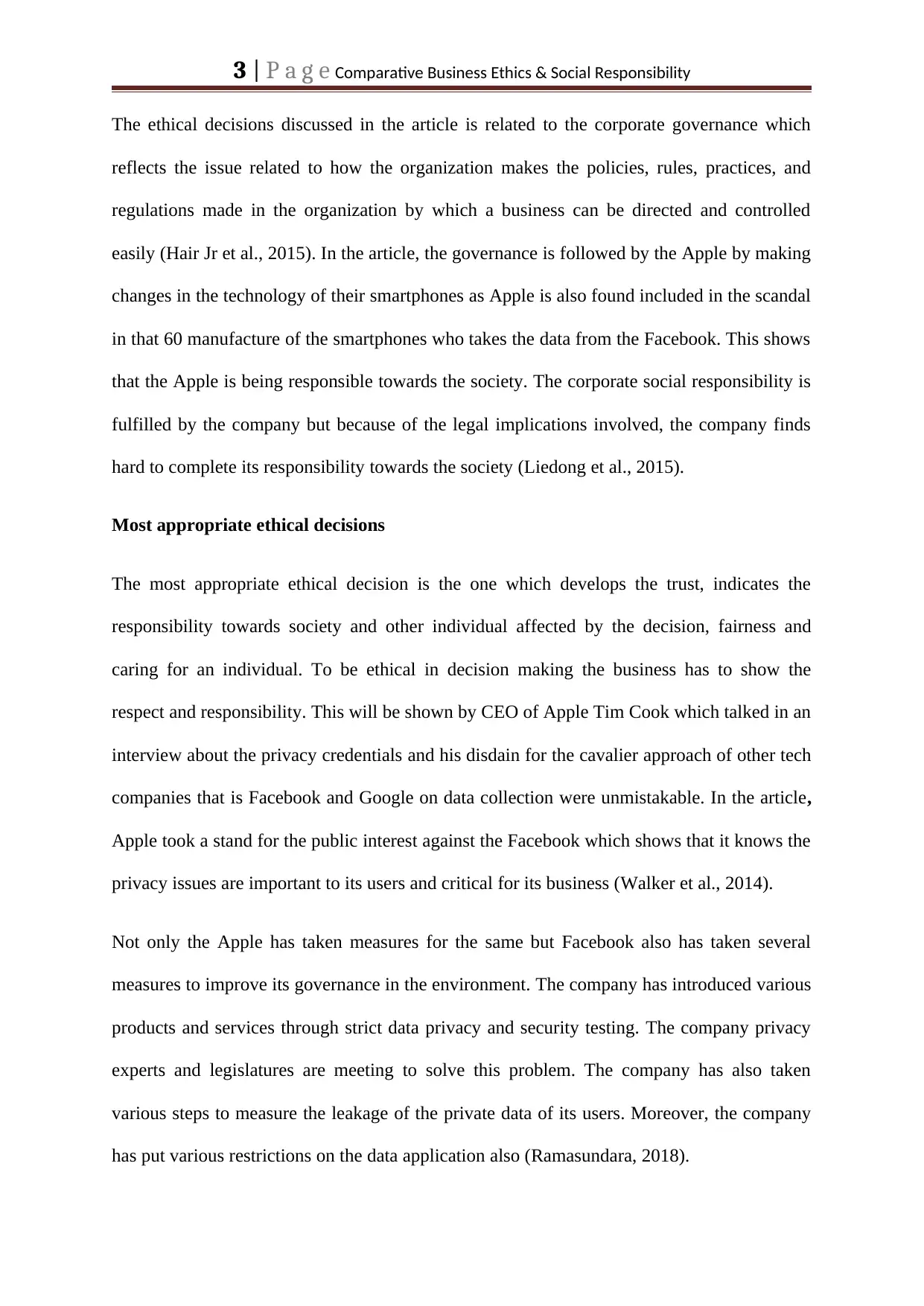
3 | P a g e Comparative Business Ethics & Social Responsibility
The ethical decisions discussed in the article is related to the corporate governance which
reflects the issue related to how the organization makes the policies, rules, practices, and
regulations made in the organization by which a business can be directed and controlled
easily (Hair Jr et al., 2015). In the article, the governance is followed by the Apple by making
changes in the technology of their smartphones as Apple is also found included in the scandal
in that 60 manufacture of the smartphones who takes the data from the Facebook. This shows
that the Apple is being responsible towards the society. The corporate social responsibility is
fulfilled by the company but because of the legal implications involved, the company finds
hard to complete its responsibility towards the society (Liedong et al., 2015).
Most appropriate ethical decisions
The most appropriate ethical decision is the one which develops the trust, indicates the
responsibility towards society and other individual affected by the decision, fairness and
caring for an individual. To be ethical in decision making the business has to show the
respect and responsibility. This will be shown by CEO of Apple Tim Cook which talked in an
interview about the privacy credentials and his disdain for the cavalier approach of other tech
companies that is Facebook and Google on data collection were unmistakable. In the article,
Apple took a stand for the public interest against the Facebook which shows that it knows the
privacy issues are important to its users and critical for its business (Walker et al., 2014).
Not only the Apple has taken measures for the same but Facebook also has taken several
measures to improve its governance in the environment. The company has introduced various
products and services through strict data privacy and security testing. The company privacy
experts and legislatures are meeting to solve this problem. The company has also taken
various steps to measure the leakage of the private data of its users. Moreover, the company
has put various restrictions on the data application also (Ramasundara, 2018).
The ethical decisions discussed in the article is related to the corporate governance which
reflects the issue related to how the organization makes the policies, rules, practices, and
regulations made in the organization by which a business can be directed and controlled
easily (Hair Jr et al., 2015). In the article, the governance is followed by the Apple by making
changes in the technology of their smartphones as Apple is also found included in the scandal
in that 60 manufacture of the smartphones who takes the data from the Facebook. This shows
that the Apple is being responsible towards the society. The corporate social responsibility is
fulfilled by the company but because of the legal implications involved, the company finds
hard to complete its responsibility towards the society (Liedong et al., 2015).
Most appropriate ethical decisions
The most appropriate ethical decision is the one which develops the trust, indicates the
responsibility towards society and other individual affected by the decision, fairness and
caring for an individual. To be ethical in decision making the business has to show the
respect and responsibility. This will be shown by CEO of Apple Tim Cook which talked in an
interview about the privacy credentials and his disdain for the cavalier approach of other tech
companies that is Facebook and Google on data collection were unmistakable. In the article,
Apple took a stand for the public interest against the Facebook which shows that it knows the
privacy issues are important to its users and critical for its business (Walker et al., 2014).
Not only the Apple has taken measures for the same but Facebook also has taken several
measures to improve its governance in the environment. The company has introduced various
products and services through strict data privacy and security testing. The company privacy
experts and legislatures are meeting to solve this problem. The company has also taken
various steps to measure the leakage of the private data of its users. Moreover, the company
has put various restrictions on the data application also (Ramasundara, 2018).
Paraphrase This Document
Need a fresh take? Get an instant paraphrase of this document with our AI Paraphraser
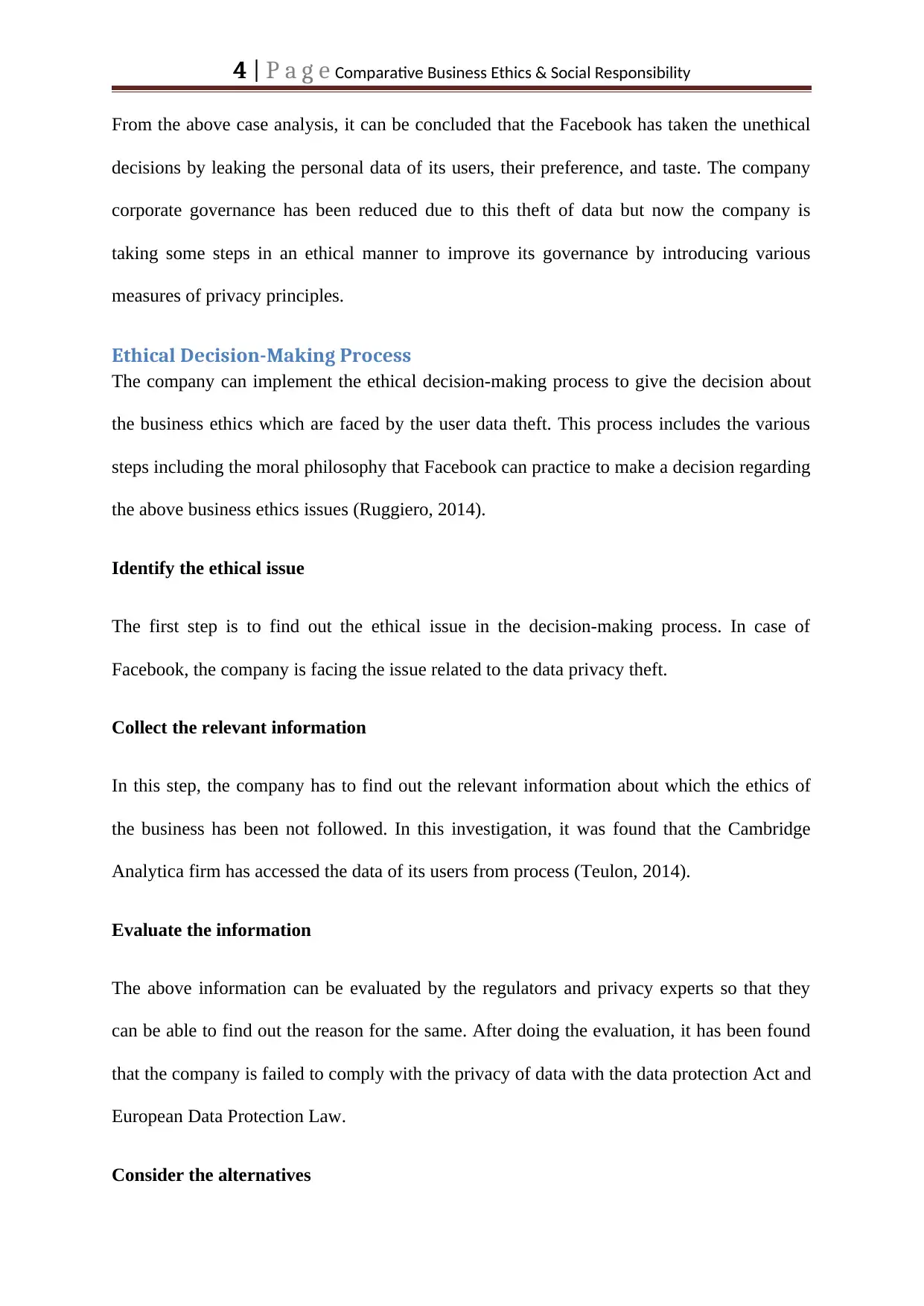
4 | P a g e Comparative Business Ethics & Social Responsibility
From the above case analysis, it can be concluded that the Facebook has taken the unethical
decisions by leaking the personal data of its users, their preference, and taste. The company
corporate governance has been reduced due to this theft of data but now the company is
taking some steps in an ethical manner to improve its governance by introducing various
measures of privacy principles.
Ethical Decision-Making Process
The company can implement the ethical decision-making process to give the decision about
the business ethics which are faced by the user data theft. This process includes the various
steps including the moral philosophy that Facebook can practice to make a decision regarding
the above business ethics issues (Ruggiero, 2014).
Identify the ethical issue
The first step is to find out the ethical issue in the decision-making process. In case of
Facebook, the company is facing the issue related to the data privacy theft.
Collect the relevant information
In this step, the company has to find out the relevant information about which the ethics of
the business has been not followed. In this investigation, it was found that the Cambridge
Analytica firm has accessed the data of its users from process (Teulon, 2014).
Evaluate the information
The above information can be evaluated by the regulators and privacy experts so that they
can be able to find out the reason for the same. After doing the evaluation, it has been found
that the company is failed to comply with the privacy of data with the data protection Act and
European Data Protection Law.
Consider the alternatives
From the above case analysis, it can be concluded that the Facebook has taken the unethical
decisions by leaking the personal data of its users, their preference, and taste. The company
corporate governance has been reduced due to this theft of data but now the company is
taking some steps in an ethical manner to improve its governance by introducing various
measures of privacy principles.
Ethical Decision-Making Process
The company can implement the ethical decision-making process to give the decision about
the business ethics which are faced by the user data theft. This process includes the various
steps including the moral philosophy that Facebook can practice to make a decision regarding
the above business ethics issues (Ruggiero, 2014).
Identify the ethical issue
The first step is to find out the ethical issue in the decision-making process. In case of
Facebook, the company is facing the issue related to the data privacy theft.
Collect the relevant information
In this step, the company has to find out the relevant information about which the ethics of
the business has been not followed. In this investigation, it was found that the Cambridge
Analytica firm has accessed the data of its users from process (Teulon, 2014).
Evaluate the information
The above information can be evaluated by the regulators and privacy experts so that they
can be able to find out the reason for the same. After doing the evaluation, it has been found
that the company is failed to comply with the privacy of data with the data protection Act and
European Data Protection Law.
Consider the alternatives
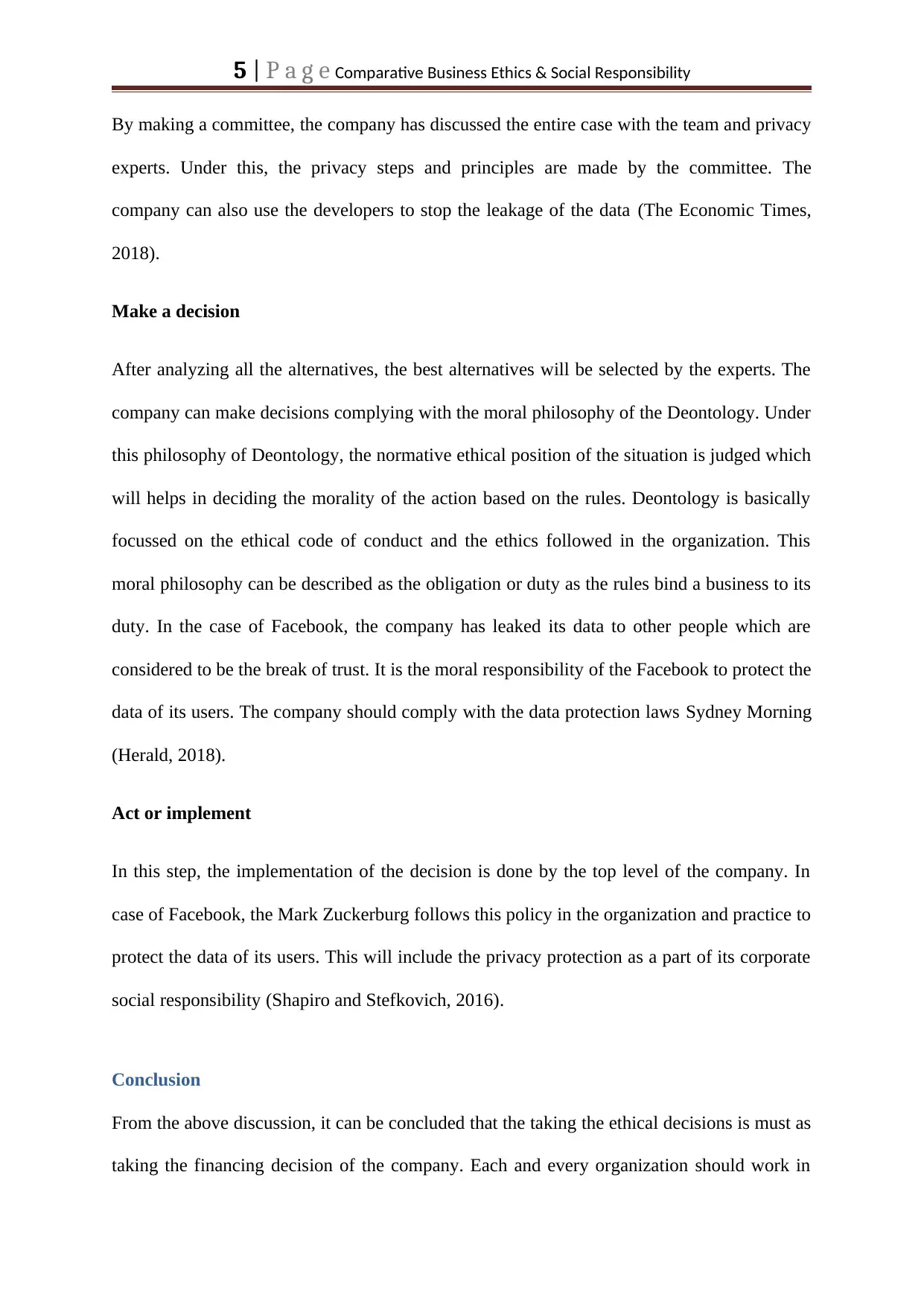
5 | P a g e Comparative Business Ethics & Social Responsibility
By making a committee, the company has discussed the entire case with the team and privacy
experts. Under this, the privacy steps and principles are made by the committee. The
company can also use the developers to stop the leakage of the data (The Economic Times,
2018).
Make a decision
After analyzing all the alternatives, the best alternatives will be selected by the experts. The
company can make decisions complying with the moral philosophy of the Deontology. Under
this philosophy of Deontology, the normative ethical position of the situation is judged which
will helps in deciding the morality of the action based on the rules. Deontology is basically
focussed on the ethical code of conduct and the ethics followed in the organization. This
moral philosophy can be described as the obligation or duty as the rules bind a business to its
duty. In the case of Facebook, the company has leaked its data to other people which are
considered to be the break of trust. It is the moral responsibility of the Facebook to protect the
data of its users. The company should comply with the data protection laws Sydney Morning
(Herald, 2018).
Act or implement
In this step, the implementation of the decision is done by the top level of the company. In
case of Facebook, the Mark Zuckerburg follows this policy in the organization and practice to
protect the data of its users. This will include the privacy protection as a part of its corporate
social responsibility (Shapiro and Stefkovich, 2016).
Conclusion
From the above discussion, it can be concluded that the taking the ethical decisions is must as
taking the financing decision of the company. Each and every organization should work in
By making a committee, the company has discussed the entire case with the team and privacy
experts. Under this, the privacy steps and principles are made by the committee. The
company can also use the developers to stop the leakage of the data (The Economic Times,
2018).
Make a decision
After analyzing all the alternatives, the best alternatives will be selected by the experts. The
company can make decisions complying with the moral philosophy of the Deontology. Under
this philosophy of Deontology, the normative ethical position of the situation is judged which
will helps in deciding the morality of the action based on the rules. Deontology is basically
focussed on the ethical code of conduct and the ethics followed in the organization. This
moral philosophy can be described as the obligation or duty as the rules bind a business to its
duty. In the case of Facebook, the company has leaked its data to other people which are
considered to be the break of trust. It is the moral responsibility of the Facebook to protect the
data of its users. The company should comply with the data protection laws Sydney Morning
(Herald, 2018).
Act or implement
In this step, the implementation of the decision is done by the top level of the company. In
case of Facebook, the Mark Zuckerburg follows this policy in the organization and practice to
protect the data of its users. This will include the privacy protection as a part of its corporate
social responsibility (Shapiro and Stefkovich, 2016).
Conclusion
From the above discussion, it can be concluded that the taking the ethical decisions is must as
taking the financing decision of the company. Each and every organization should work in
⊘ This is a preview!⊘
Do you want full access?
Subscribe today to unlock all pages.

Trusted by 1+ million students worldwide
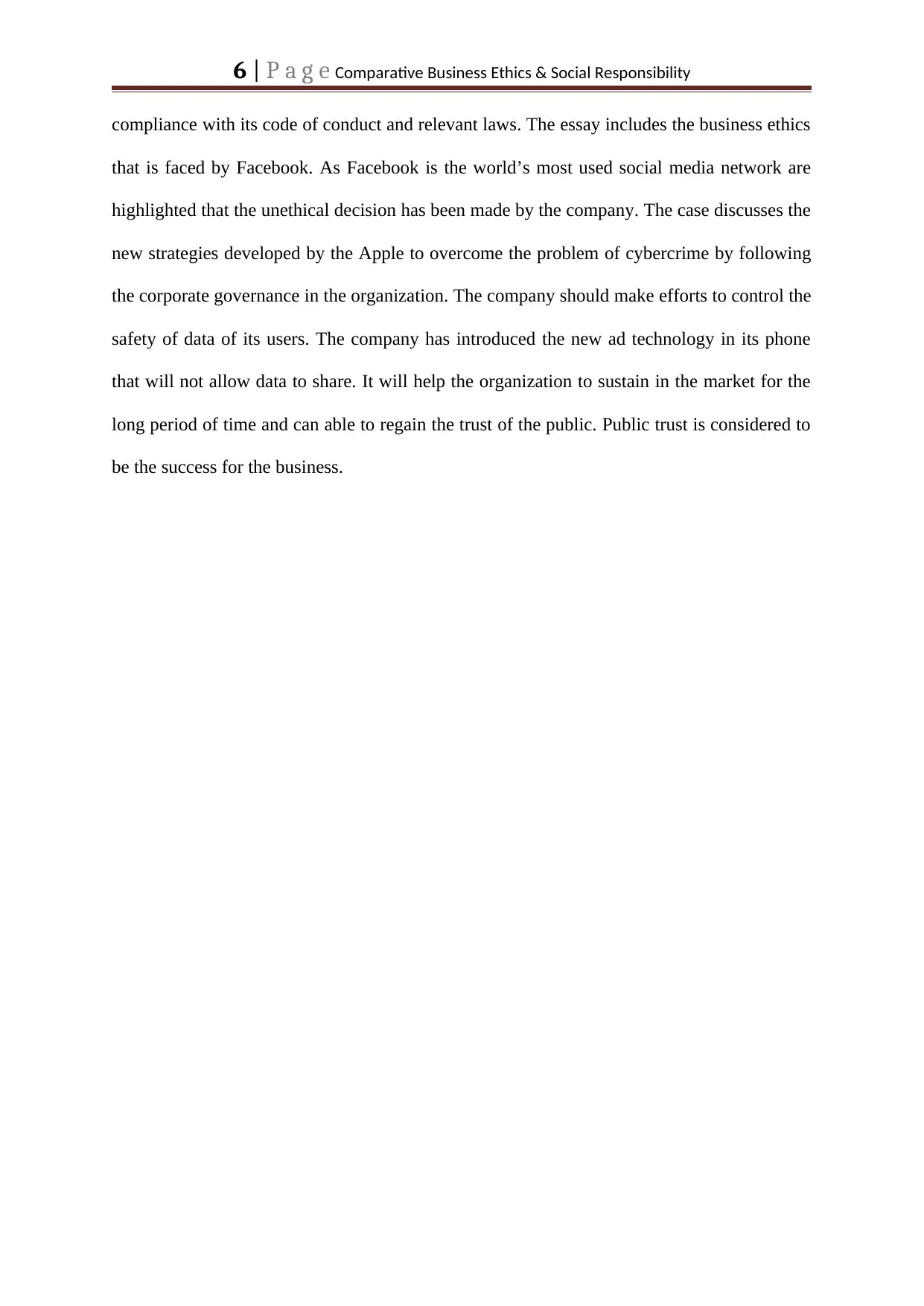
6 | P a g e Comparative Business Ethics & Social Responsibility
compliance with its code of conduct and relevant laws. The essay includes the business ethics
that is faced by Facebook. As Facebook is the world’s most used social media network are
highlighted that the unethical decision has been made by the company. The case discusses the
new strategies developed by the Apple to overcome the problem of cybercrime by following
the corporate governance in the organization. The company should make efforts to control the
safety of data of its users. The company has introduced the new ad technology in its phone
that will not allow data to share. It will help the organization to sustain in the market for the
long period of time and can able to regain the trust of the public. Public trust is considered to
be the success for the business.
compliance with its code of conduct and relevant laws. The essay includes the business ethics
that is faced by Facebook. As Facebook is the world’s most used social media network are
highlighted that the unethical decision has been made by the company. The case discusses the
new strategies developed by the Apple to overcome the problem of cybercrime by following
the corporate governance in the organization. The company should make efforts to control the
safety of data of its users. The company has introduced the new ad technology in its phone
that will not allow data to share. It will help the organization to sustain in the market for the
long period of time and can able to regain the trust of the public. Public trust is considered to
be the success for the business.
Paraphrase This Document
Need a fresh take? Get an instant paraphrase of this document with our AI Paraphraser
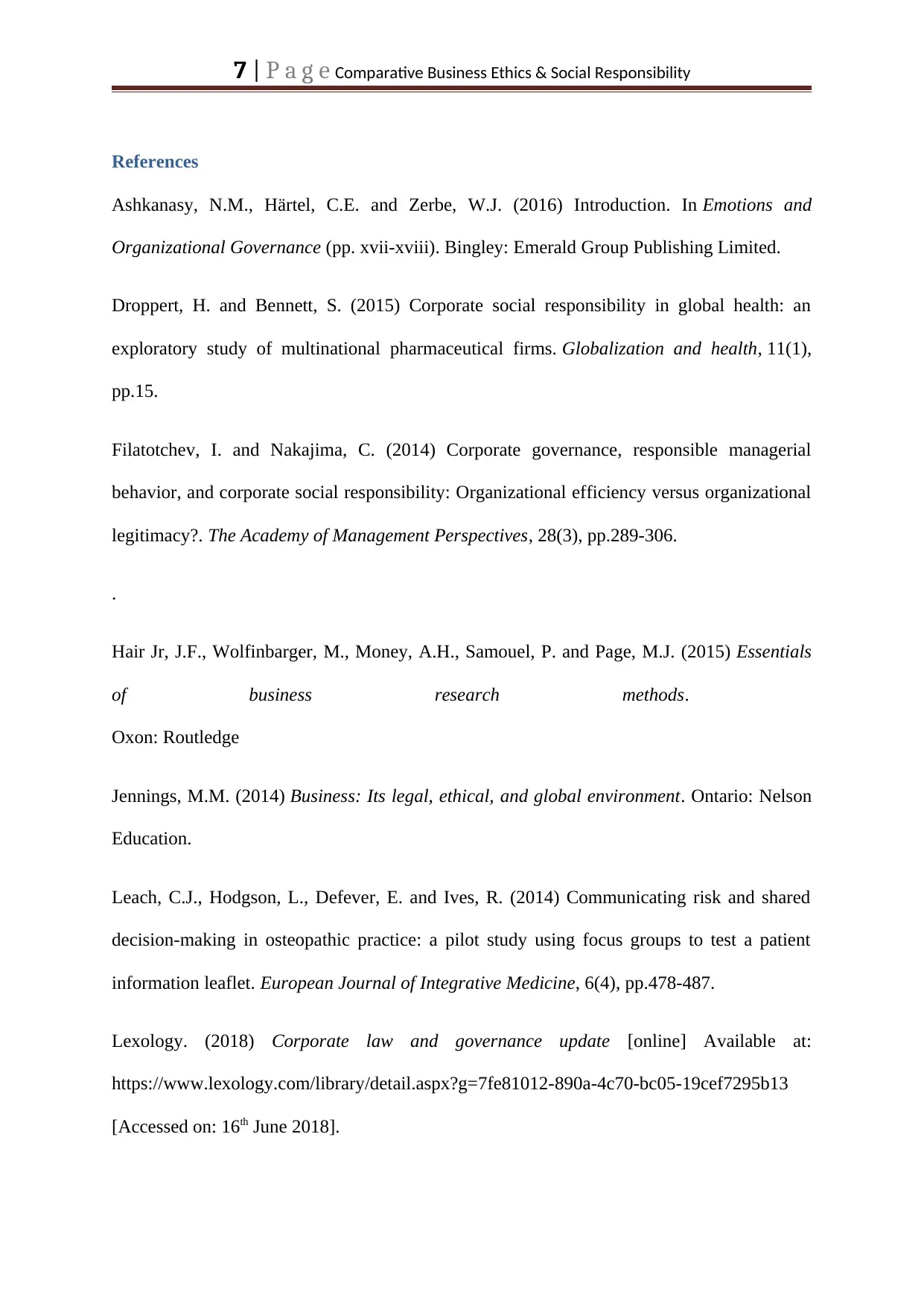
7 | P a g e Comparative Business Ethics & Social Responsibility
References
Ashkanasy, N.M., Härtel, C.E. and Zerbe, W.J. (2016) Introduction. In Emotions and
Organizational Governance (pp. xvii-xviii). Bingley: Emerald Group Publishing Limited.
Droppert, H. and Bennett, S. (2015) Corporate social responsibility in global health: an
exploratory study of multinational pharmaceutical firms. Globalization and health, 11(1),
pp.15.
Filatotchev, I. and Nakajima, C. (2014) Corporate governance, responsible managerial
behavior, and corporate social responsibility: Organizational efficiency versus organizational
legitimacy?. The Academy of Management Perspectives, 28(3), pp.289-306.
.
Hair Jr, J.F., Wolfinbarger, M., Money, A.H., Samouel, P. and Page, M.J. (2015) Essentials
of business research methods.
Oxon: Routledge
Jennings, M.M. (2014) Business: Its legal, ethical, and global environment. Ontario: Nelson
Education.
Leach, C.J., Hodgson, L., Defever, E. and Ives, R. (2014) Communicating risk and shared
decision-making in osteopathic practice: a pilot study using focus groups to test a patient
information leaflet. European Journal of Integrative Medicine, 6(4), pp.478-487.
Lexology. (2018) Corporate law and governance update [online] Available at:
https://www.lexology.com/library/detail.aspx?g=7fe81012-890a-4c70-bc05-19cef7295b13
[Accessed on: 16th June 2018].
References
Ashkanasy, N.M., Härtel, C.E. and Zerbe, W.J. (2016) Introduction. In Emotions and
Organizational Governance (pp. xvii-xviii). Bingley: Emerald Group Publishing Limited.
Droppert, H. and Bennett, S. (2015) Corporate social responsibility in global health: an
exploratory study of multinational pharmaceutical firms. Globalization and health, 11(1),
pp.15.
Filatotchev, I. and Nakajima, C. (2014) Corporate governance, responsible managerial
behavior, and corporate social responsibility: Organizational efficiency versus organizational
legitimacy?. The Academy of Management Perspectives, 28(3), pp.289-306.
.
Hair Jr, J.F., Wolfinbarger, M., Money, A.H., Samouel, P. and Page, M.J. (2015) Essentials
of business research methods.
Oxon: Routledge
Jennings, M.M. (2014) Business: Its legal, ethical, and global environment. Ontario: Nelson
Education.
Leach, C.J., Hodgson, L., Defever, E. and Ives, R. (2014) Communicating risk and shared
decision-making in osteopathic practice: a pilot study using focus groups to test a patient
information leaflet. European Journal of Integrative Medicine, 6(4), pp.478-487.
Lexology. (2018) Corporate law and governance update [online] Available at:
https://www.lexology.com/library/detail.aspx?g=7fe81012-890a-4c70-bc05-19cef7295b13
[Accessed on: 16th June 2018].
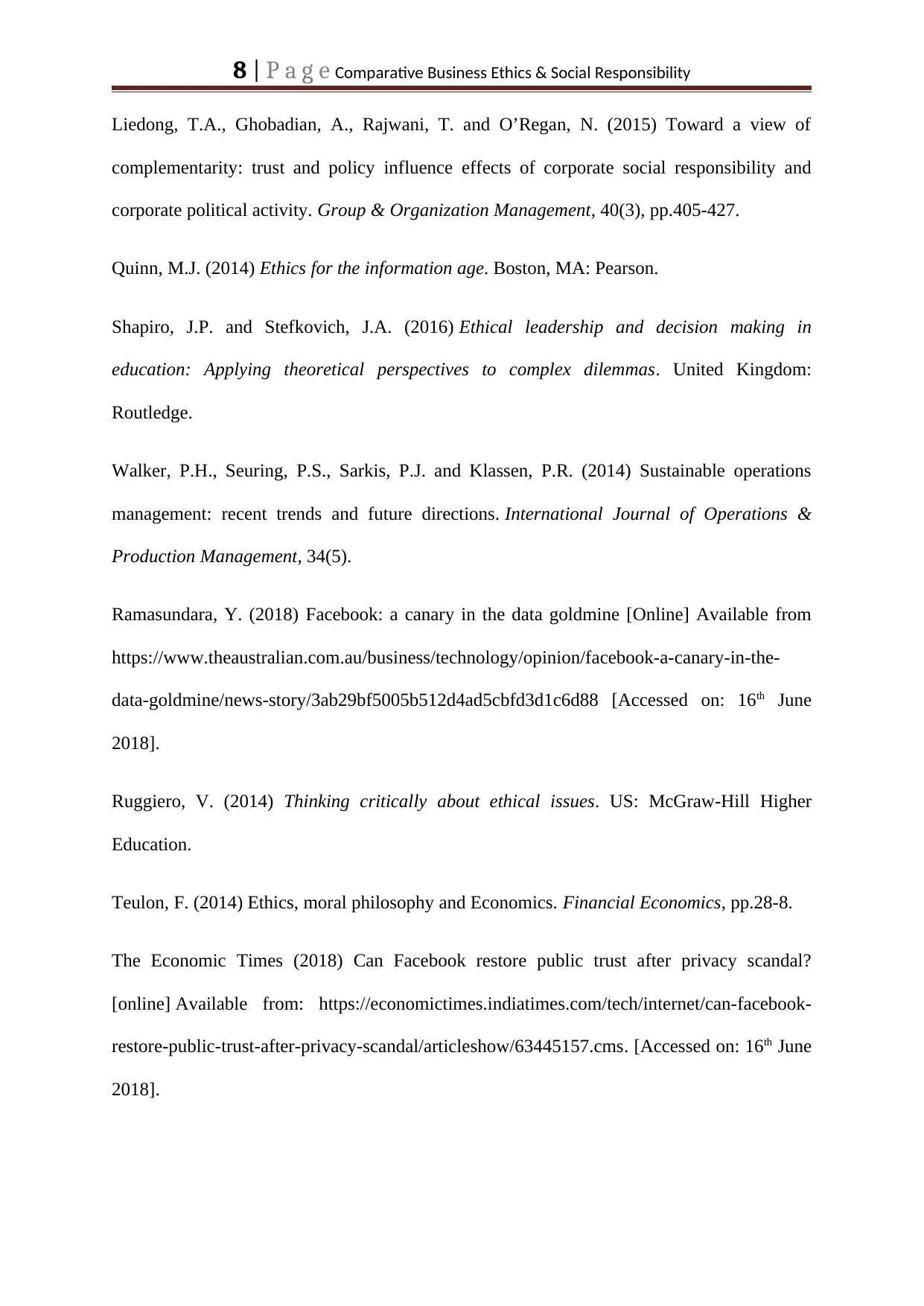
8 | P a g e Comparative Business Ethics & Social Responsibility
Liedong, T.A., Ghobadian, A., Rajwani, T. and O’Regan, N. (2015) Toward a view of
complementarity: trust and policy influence effects of corporate social responsibility and
corporate political activity. Group & Organization Management, 40(3), pp.405-427.
Quinn, M.J. (2014) Ethics for the information age. Boston, MA: Pearson.
Shapiro, J.P. and Stefkovich, J.A. (2016) Ethical leadership and decision making in
education: Applying theoretical perspectives to complex dilemmas. United Kingdom:
Routledge.
Walker, P.H., Seuring, P.S., Sarkis, P.J. and Klassen, P.R. (2014) Sustainable operations
management: recent trends and future directions. International Journal of Operations &
Production Management, 34(5).
Ramasundara, Y. (2018) Facebook: a canary in the data goldmine [Online] Available from
https://www.theaustralian.com.au/business/technology/opinion/facebook-a-canary-in-the-
data-goldmine/news-story/3ab29bf5005b512d4ad5cbfd3d1c6d88 [Accessed on: 16th June
2018].
Ruggiero, V. (2014) Thinking critically about ethical issues. US: McGraw-Hill Higher
Education.
Teulon, F. (2014) Ethics, moral philosophy and Economics. Financial Economics, pp.28-8.
The Economic Times (2018) Can Facebook restore public trust after privacy scandal?
[online] Available from: https://economictimes.indiatimes.com/tech/internet/can-facebook-
restore-public-trust-after-privacy-scandal/articleshow/63445157.cms. [Accessed on: 16th June
2018].
Liedong, T.A., Ghobadian, A., Rajwani, T. and O’Regan, N. (2015) Toward a view of
complementarity: trust and policy influence effects of corporate social responsibility and
corporate political activity. Group & Organization Management, 40(3), pp.405-427.
Quinn, M.J. (2014) Ethics for the information age. Boston, MA: Pearson.
Shapiro, J.P. and Stefkovich, J.A. (2016) Ethical leadership and decision making in
education: Applying theoretical perspectives to complex dilemmas. United Kingdom:
Routledge.
Walker, P.H., Seuring, P.S., Sarkis, P.J. and Klassen, P.R. (2014) Sustainable operations
management: recent trends and future directions. International Journal of Operations &
Production Management, 34(5).
Ramasundara, Y. (2018) Facebook: a canary in the data goldmine [Online] Available from
https://www.theaustralian.com.au/business/technology/opinion/facebook-a-canary-in-the-
data-goldmine/news-story/3ab29bf5005b512d4ad5cbfd3d1c6d88 [Accessed on: 16th June
2018].
Ruggiero, V. (2014) Thinking critically about ethical issues. US: McGraw-Hill Higher
Education.
Teulon, F. (2014) Ethics, moral philosophy and Economics. Financial Economics, pp.28-8.
The Economic Times (2018) Can Facebook restore public trust after privacy scandal?
[online] Available from: https://economictimes.indiatimes.com/tech/internet/can-facebook-
restore-public-trust-after-privacy-scandal/articleshow/63445157.cms. [Accessed on: 16th June
2018].
⊘ This is a preview!⊘
Do you want full access?
Subscribe today to unlock all pages.

Trusted by 1+ million students worldwide

9 | P a g e Comparative Business Ethics & Social Responsibility
Sydney Morning Herald. (2018) Apple joins the war on Facebook over privacy [Online]
Available from: https://www.smh.com.au/business/companies/apple-joins-the-war-on-
facebook-over-privacy-20180607-p4zk3n.html [Accessed on: 16th June 2018]
Sydney Morning Herald. (2018) Apple joins the war on Facebook over privacy [Online]
Available from: https://www.smh.com.au/business/companies/apple-joins-the-war-on-
facebook-over-privacy-20180607-p4zk3n.html [Accessed on: 16th June 2018]
Paraphrase This Document
Need a fresh take? Get an instant paraphrase of this document with our AI Paraphraser
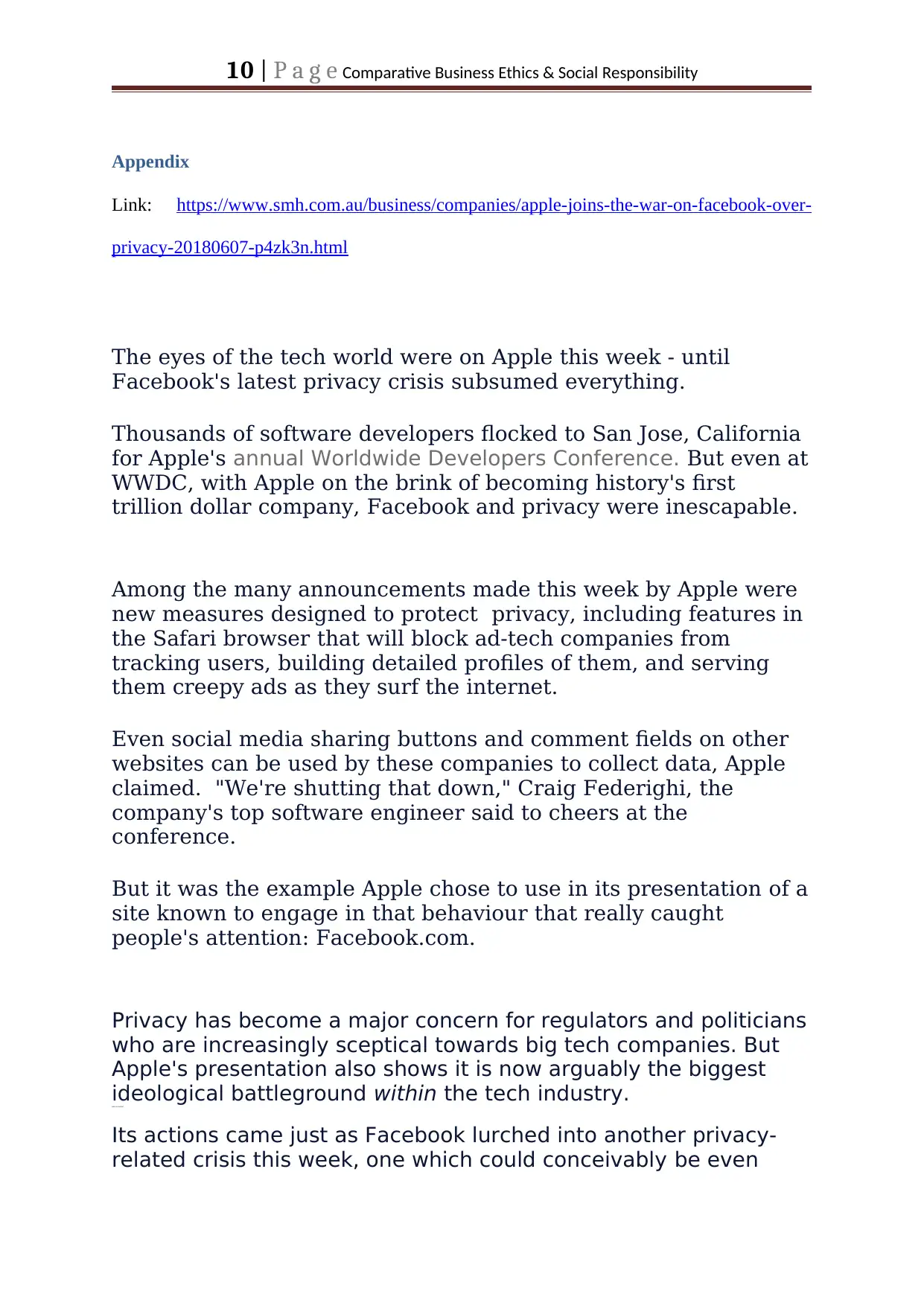
10 | P a g e Comparative Business Ethics & Social Responsibility
Appendix
Link: https://www.smh.com.au/business/companies/apple-joins-the-war-on-facebook-over-
privacy-20180607-p4zk3n.html
The eyes of the tech world were on Apple this week - until
Facebook's latest privacy crisis subsumed everything.
Thousands of software developers flocked to San Jose, California
for Apple's annual Worldwide Developers Conference. But even at
WWDC, with Apple on the brink of becoming history's first
trillion dollar company, Facebook and privacy were inescapable.
Among the many announcements made this week by Apple were
new measures designed to protect privacy, including features in
the Safari browser that will block ad-tech companies from
tracking users, building detailed profiles of them, and serving
them creepy ads as they surf the internet.
Even social media sharing buttons and comment fields on other
websites can be used by these companies to collect data, Apple
claimed. "We're shutting that down," Craig Federighi, the
company's top software engineer said to cheers at the
conference.
But it was the example Apple chose to use in its presentation of a
site known to engage in that behaviour that really caught
people's attention: Facebook.com.
Privacy has become a major concern for regulators and politicians
who are increasingly sceptical towards big tech companies. But
Apple's presentation also shows it is now arguably the biggest
ideological battleground within the tech industry.Add to shortlist
Its actions came just as Facebook lurched into another privacy-
related crisis this week, one which could conceivably be even
Appendix
Link: https://www.smh.com.au/business/companies/apple-joins-the-war-on-facebook-over-
privacy-20180607-p4zk3n.html
The eyes of the tech world were on Apple this week - until
Facebook's latest privacy crisis subsumed everything.
Thousands of software developers flocked to San Jose, California
for Apple's annual Worldwide Developers Conference. But even at
WWDC, with Apple on the brink of becoming history's first
trillion dollar company, Facebook and privacy were inescapable.
Among the many announcements made this week by Apple were
new measures designed to protect privacy, including features in
the Safari browser that will block ad-tech companies from
tracking users, building detailed profiles of them, and serving
them creepy ads as they surf the internet.
Even social media sharing buttons and comment fields on other
websites can be used by these companies to collect data, Apple
claimed. "We're shutting that down," Craig Federighi, the
company's top software engineer said to cheers at the
conference.
But it was the example Apple chose to use in its presentation of a
site known to engage in that behaviour that really caught
people's attention: Facebook.com.
Privacy has become a major concern for regulators and politicians
who are increasingly sceptical towards big tech companies. But
Apple's presentation also shows it is now arguably the biggest
ideological battleground within the tech industry.Add to shortlist
Its actions came just as Facebook lurched into another privacy-
related crisis this week, one which could conceivably be even
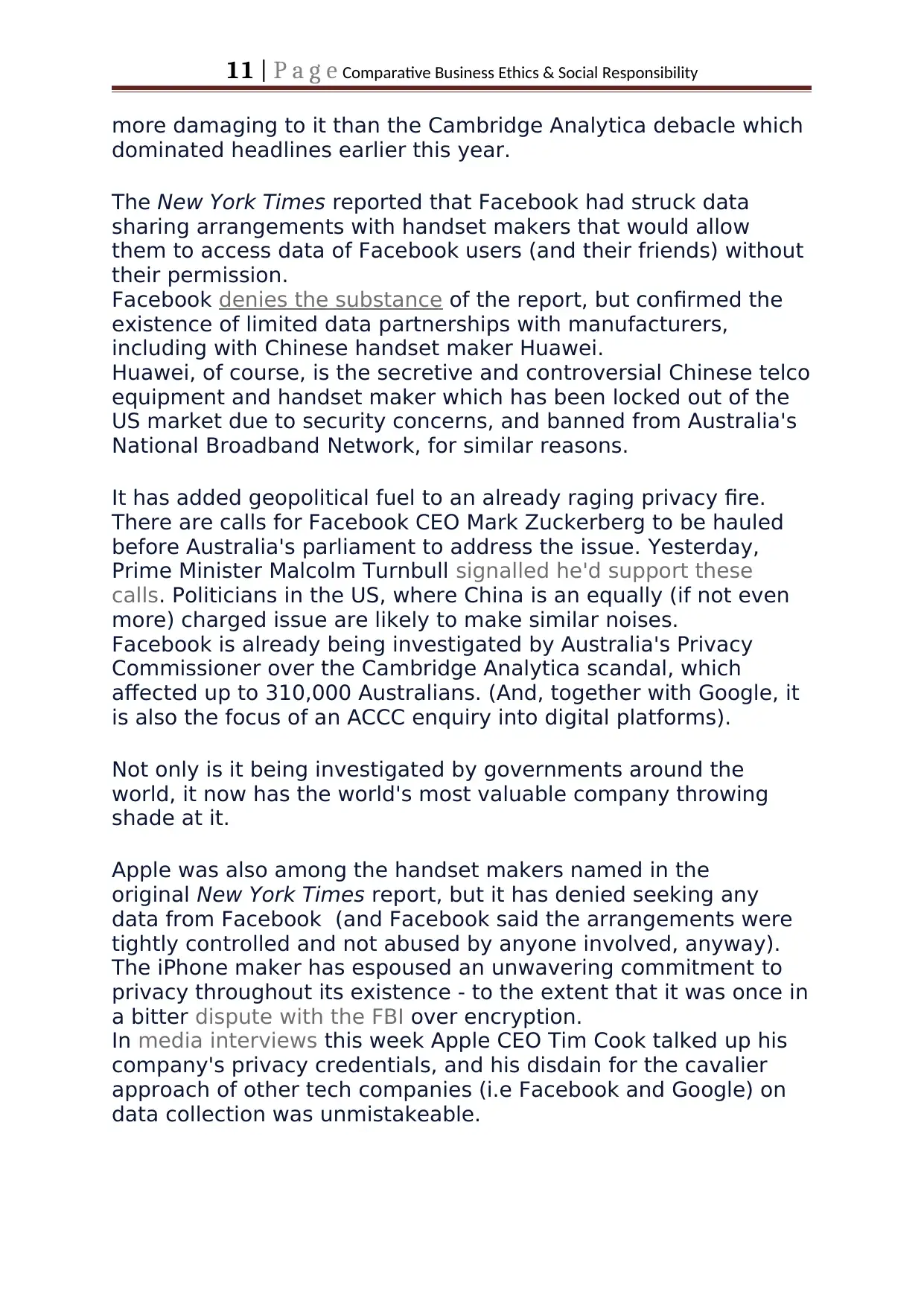
11 | P a g e Comparative Business Ethics & Social Responsibility
more damaging to it than the Cambridge Analytica debacle which
dominated headlines earlier this year.
The New York Times reported that Facebook had struck data
sharing arrangements with handset makers that would allow
them to access data of Facebook users (and their friends) without
their permission.
Facebook denies the substance of the report, but confirmed the
existence of limited data partnerships with manufacturers,
including with Chinese handset maker Huawei.
Huawei, of course, is the secretive and controversial Chinese telco
equipment and handset maker which has been locked out of the
US market due to security concerns, and banned from Australia's
National Broadband Network, for similar reasons.
It has added geopolitical fuel to an already raging privacy fire.
There are calls for Facebook CEO Mark Zuckerberg to be hauled
before Australia's parliament to address the issue. Yesterday,
Prime Minister Malcolm Turnbull signalled he'd support these
calls. Politicians in the US, where China is an equally (if not even
more) charged issue are likely to make similar noises.
Facebook is already being investigated by Australia's Privacy
Commissioner over the Cambridge Analytica scandal, which
affected up to 310,000 Australians. (And, together with Google, it
is also the focus of an ACCC enquiry into digital platforms).
Not only is it being investigated by governments around the
world, it now has the world's most valuable company throwing
shade at it.
Apple was also among the handset makers named in the
original New York Times report, but it has denied seeking any
data from Facebook (and Facebook said the arrangements were
tightly controlled and not abused by anyone involved, anyway).
The iPhone maker has espoused an unwavering commitment to
privacy throughout its existence - to the extent that it was once in
a bitter dispute with the FBI over encryption.
In media interviews this week Apple CEO Tim Cook talked up his
company's privacy credentials, and his disdain for the cavalier
approach of other tech companies (i.e Facebook and Google) on
data collection was unmistakeable.
more damaging to it than the Cambridge Analytica debacle which
dominated headlines earlier this year.
The New York Times reported that Facebook had struck data
sharing arrangements with handset makers that would allow
them to access data of Facebook users (and their friends) without
their permission.
Facebook denies the substance of the report, but confirmed the
existence of limited data partnerships with manufacturers,
including with Chinese handset maker Huawei.
Huawei, of course, is the secretive and controversial Chinese telco
equipment and handset maker which has been locked out of the
US market due to security concerns, and banned from Australia's
National Broadband Network, for similar reasons.
It has added geopolitical fuel to an already raging privacy fire.
There are calls for Facebook CEO Mark Zuckerberg to be hauled
before Australia's parliament to address the issue. Yesterday,
Prime Minister Malcolm Turnbull signalled he'd support these
calls. Politicians in the US, where China is an equally (if not even
more) charged issue are likely to make similar noises.
Facebook is already being investigated by Australia's Privacy
Commissioner over the Cambridge Analytica scandal, which
affected up to 310,000 Australians. (And, together with Google, it
is also the focus of an ACCC enquiry into digital platforms).
Not only is it being investigated by governments around the
world, it now has the world's most valuable company throwing
shade at it.
Apple was also among the handset makers named in the
original New York Times report, but it has denied seeking any
data from Facebook (and Facebook said the arrangements were
tightly controlled and not abused by anyone involved, anyway).
The iPhone maker has espoused an unwavering commitment to
privacy throughout its existence - to the extent that it was once in
a bitter dispute with the FBI over encryption.
In media interviews this week Apple CEO Tim Cook talked up his
company's privacy credentials, and his disdain for the cavalier
approach of other tech companies (i.e Facebook and Google) on
data collection was unmistakeable.
⊘ This is a preview!⊘
Do you want full access?
Subscribe today to unlock all pages.

Trusted by 1+ million students worldwide
1 out of 13
Related Documents
Your All-in-One AI-Powered Toolkit for Academic Success.
+13062052269
info@desklib.com
Available 24*7 on WhatsApp / Email
![[object Object]](/_next/static/media/star-bottom.7253800d.svg)
Unlock your academic potential
Copyright © 2020–2026 A2Z Services. All Rights Reserved. Developed and managed by ZUCOL.





